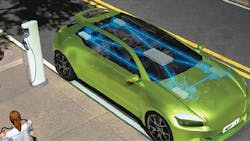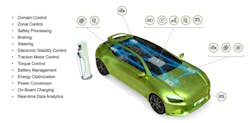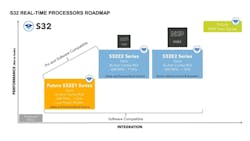Real-Time Processors Target Software-Defined Vehicles
In computing, “real-time” describes operations that respond to events and must be completed within a specified time window. Otherwise, an application may not work properly.
Real-time applications must operate consistently and predictably, so they’re called "deterministic.” A real-time automotive processor maintains safe, deterministic operation like an automotive microcontroller, but can provide the combination of gigahertz speed, multi-application isolation, and memory expansion capabilities that are more typical of microprocessors.
New Real-Time Processors
On that front, NXP Semiconductors extended its S32 Automotive Platform by adding a new class of real-time processors that offer the critical deterministic behavior of safe microcontrollers, as well as gigahertz speed, multi-application isolation, and memory expansion. Thus, the new 16-nm S32Z and S32E real-time processor families are well-matched for the safe integration of software-defined vehicles.
To meet timing constraints, a processor core must offer fast interrupt responses and provide deterministic execution, which maps well to the Arm Cortex-R52 processor cores used in the S32Z and S32E families. The cores also support functional safety and hypervisors that are needed for these safe, real-time applications.
The NXP S32Z processors are designed for safety processing and domain and zonal control. They can integrate applications such as vehicle dynamics and chassis control.
The software-compatible S32E processors offer additional complex timers and 3.3-/5-V analog-to-digital converters (ADCs) and 5-V I/O, making them suitable for electric-vehicle (EV) control and smart actuation applications.
Hardware to Software
The S32Z and S32E processors are designed to support the move from a hardware-centric approach of adding new functionality with boxes or electronic control units (ECUs) to a software-defined approach with “virtual ECUs” running as software tasks on a single, multicore real-time processor. Hence, the S32Z and S32E processors can support the new software-defined vehicle requirements.
The initial S32Z2 and S32E2 series that are sampling today include eight Cortex-R52 processor cores with split-lock support that operate at up to 1 GHz. With the split-lock capability, different configurations of the processor cores can be selected at boot, depending on the application needs. For example, there’s support for four lockstep pairs, two lockstep pairs with four non-lockstep processor cores, or all eight processor cores running in non-lockstep for maximum flexibility.
The 16-nm S32Z2 processors combine real-time and DSP/ML (machine learning) processing with hardware virtualization, scalable non-volatile memory, flexible expansion memory support, and network acceleration.
The processors were developed according to processes that are certified to ISO/SAE 21434 for cybersecurity and ISO 26262 for ASIL D functional safety. They’re software-compatible with the S32E2 processors that target EV control and smart actuation applications.
S32Z2 processors are enabled with NXP’s GreenVIP vehicle integration platform software and the GreenBox 3 development platform. GreenBox 3 is a development platform for S32Z2/E2 real-time processors, integrating processing, peripherals, networking, and connectivity interfaces.
The GreenBox 3 Development Platform supports the integration of real-time applications such as vehicle dynamics, battery and energy management, motor inverter control, and power conversion for central, domain, and zonal architectures in new vehicle architectures and software-defined vehicles.
Memory Features and Support
NXP’s S32Z and S32E processors isolate independent real-time applications with “core-to-pin” hardware virtualization and resource firewalls for freedom from interference. The processors are available with up to 64 MB of integrated flash memory for large, zero-downtime over-the-air (OTA) updates. They also support LPDDR4 DRAM and flash expansion memory with an execute-in-place mode for large applications and AUTOSAR adaptive applications.
A communications accelerator (FlexLLCE) supporting 24 CAN interfaces, along with a Gigabit Ethernet switch supporting time-sensitive-networking (TSN), provides vehicle data seamlessly to the virtual ECUs to improve efficiency and streamline software development.
The S32E processors add smart actuation capabilities, specifically in the form of advanced timers and high-resolution ADCs and 5-V I/Os, for EV integration applications with direct-drive motor control.
The processors’ speed of up to 1 GHz surpasses that of current 28-nm safe microcontrollers, which typically run in the 300- to 400-MHz range. This enables the S32Z and S32E processors to support more complex real-time applications and higher levels of software integration that require higher performance.
Their ability to accelerate up to 24 CAN 2.0 and CAN FD interfaces also offers advantages in being able to process CAN traffic deterministically and efficiently without having to interrupt the processor cores.
Hardware Virtualization Meets New Architecture Demands
The automotive industry’s move to domain and zonal architectures is attractive to carmakers, enabling them to optimize wiring harnesses, reduce cost and weight and implement a more scalable and cost-effective, software-centric approach for developing and updating intelligent vehicles. This transformation requires processors that offer higher performance, application isolation and memory expansion capabilities to support software-defined vehicles.
With these processors, engineers can deliver the isolation and freedom from interference between the virtual ECUs as was provided by separate ECUs via the aforementioned core-to-pin hardware virtualization.
End-to-end virtualization support ensures that each virtual ECU only has access and control to specific processing, peripherals, memory, and I/Os to ensure isolation as well as support independent responses to faults that don’t impact other virtual ECUs. In addition, the hardware virtualization supports defined levels of quality-of-service with respect to external memory access.
NXP offers system support for S32Z and S32E processors to accelerate a range of designs. These include the co-developed FS86 ASIL D safety system basis chip (SBC) and PF5030 power-management IC (PMIC) with in-vehicle networking support plus Ethernet switches and PHYs and CAN transceivers, along with other analog companion chips such as the GD3160 IGBT/SiC high-voltage inverter gate driver and MC3377x battery-cell controllers.
NXP’s S32Z280 and S32E288, the first two devices in the new families, are sampling now. The company plans to sample the S32Z1 series a bit further down the road. The real-time processors will also scale into the future with 5-nm products. In fact, NXP has already developed a functional, 5-nm real-time processor test chip.


